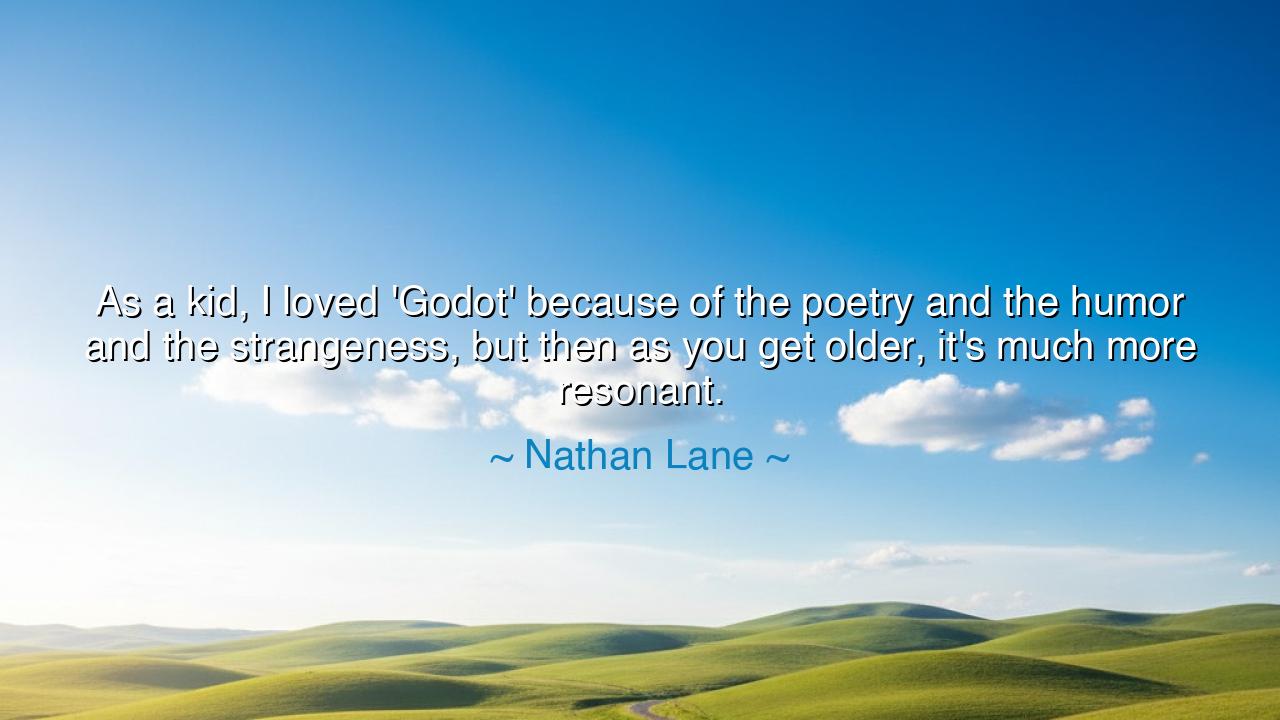
As a kid, I loved 'Godot' because of the poetry and the humor and
As a kid, I loved 'Godot' because of the poetry and the humor and the strangeness, but then as you get older, it's much more resonant.






When Nathan Lane said, “As a kid, I loved Godot because of the poetry and the humor and the strangeness, but then as you get older, it’s much more resonant,” he spoke not only as an actor but as a philosopher of life. His words reveal the eternal law of art and existence: that meaning deepens with time, and that what we once loved for its surface beauty may, in the fullness of years, reveal to us the depth of the human condition. In his reflection, there lies a profound truth—that youth delights in wonder, but age understands it. What was once simply strange becomes symbolic; what was once humorous becomes holy. For to live long enough is to see the poetry of life entwined with its sorrow, and to find resonance where once there was only sound.
The origin of this thought comes from Lane’s relationship with Samuel Beckett’s masterpiece, Waiting for Godot. As a young boy drawn to the world of theater, Lane would have been enchanted by the play’s humor, its absurd dialogue, its rhythm of repetition and nonsense. The two tramps waiting endlessly for the mysterious “Godot” seemed to him funny, perhaps even whimsical. The poetry and strangeness of Beckett’s words could charm a youthful mind unburdened by years of waiting or loss. But time, as it always does, transformed the laughter into recognition. For as Lane aged, he—like all who live long and deeply—came to know the very feeling that animates Beckett’s play: the ache of uncertainty, the endurance of hope, the quiet courage of waiting for something that may never come.
This is why Lane calls it “much more resonant.” The resonance of Godot—and indeed, of all great art—does not come from its plot but from its truth. When we are young, we live near the surface of experience, delighted by mystery but untouched by its cost. We laugh easily, for we have not yet felt the full weight of waiting. But as we grow older, we begin to see ourselves in those two lost souls, Vladimir and Estragon, who pass their days talking, laughing, despairing, and hoping. Their humor becomes our mirror. Their absurdity becomes our own. For life itself is a kind of waiting for Godot—a journey without clarity, where meaning must be made moment by moment, lest despair consume us.
Consider the life of Vincent van Gogh, a man whose days were spent waiting for understanding that never came. In his youth, he painted with fire and joy, seeing beauty in the smallest things—the glimmer of wheat, the turn of a leaf. Yet as the years passed, his art grew more intense, more desperate, more resonant with pain. He, too, laughed at life’s strangeness in his letters, but beneath that laughter lay loneliness and longing. Only after his death did the world awaken to the power of his vision. Like Beckett’s tramps, van Gogh had waited—for love, for peace, for Godot—and never saw his arrival. Yet even in that waiting, he created something eternal. His art, like Godot, speaks to the patience of the human heart—the willingness to hope when hope seems foolish.
This is the sacred lesson that Nathan Lane’s insight offers: that art, like life, reveals itself layer by layer. What delights us in youth as “funny” or “strange” returns in maturity as revelation. The humor remains—but it changes shape. It becomes not mockery, but mercy. It allows us to laugh at ourselves not because we are blind, but because we finally see. The strangeness that once amused us becomes familiar, and in that familiarity, we find compassion. The poetry that once sounded beautiful becomes true—it begins to describe our own hearts. As the soul matures, it discovers that laughter and sorrow are not opposites, but companions walking hand in hand through the corridors of time.
The ancients taught that wisdom does not come from knowledge alone, but from seeing the same thing twice—once with the eyes of innocence, and once with the eyes of understanding. Lane’s reflection is a call to live in that double vision. The young must not dismiss what they do not yet understand, and the old must not forget the wonder that once drew them to the dance. To love Godot as a child is to see magic; to love it as an adult is to recognize truth. Both are sacred, and both are necessary. For without wonder, wisdom grows weary; and without wisdom, wonder fades into naivety.
So, my children of art and of time, remember this teaching: let your understanding ripen as your years do. What now seems humorous may one day save you; what now feels strange may later feel divine. Do not fear the deepening of meaning—for that deepening is the proof that you are alive. Return to the things you loved in youth—the books, the songs, the laughter—and find what they have become within you. Like Godot, they will not have changed, but you will have. And in that change lies the secret of growth: that the soul, through the journey of years, transforms strangeness into wisdom, and laughter into light.
For as Nathan Lane reminds us, the resonance of life increases with time. The poetry, the humor, the strangeness—they are not separate threads, but one tapestry woven from joy and sorrow alike. And when you can see both—the laughter of youth and the longing of age—you will know the fullness of being human: to laugh at life’s absurdity, even as you stand in awe of its depth.






AAdministratorAdministrator
Welcome, honored guests. Please leave a comment, we will respond soon